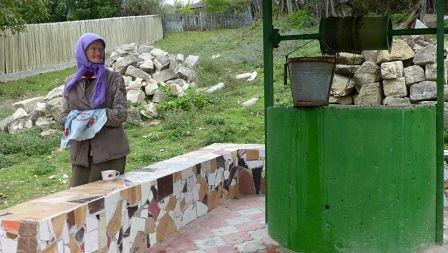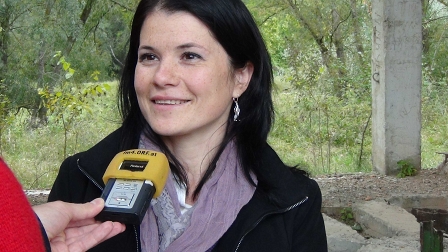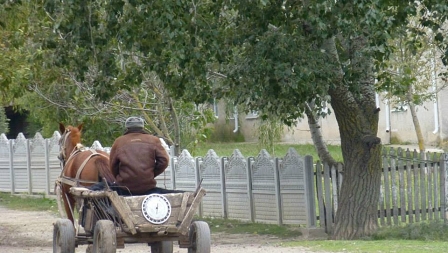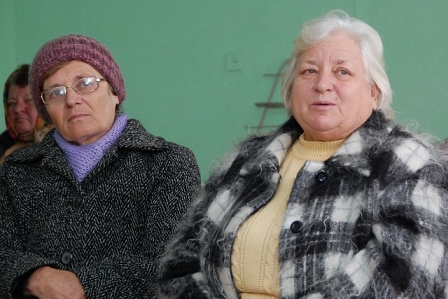Erstellt am: 2. 11. 2013 - 12:48 Uhr
The Village of Yellow Teeth
A Reality Check special this Saturday from 12.00 to 13.00, available as a Podcast after the show
80-year old Xenia hauls her water out of a shared green well in the Moldovan village of Grozesti, which lies about an hour's journey along bumpy roads north and west of the capital Chisinau. A clanking metal bucket is attached to a chain. Once full with water, it's a hard and time consuming job to manually wind the bucket back up from the depths. But for many people in Grozesti this is the only way to get water for washing, cooking or even drinking.

chris cummins
The water tastes "salty", complains Xenia but according to health experts that's the least concern. "The water can look transparent and clean," says Constantin Mihailescu, a water expert working for the Austrian Development Agency , "but it is very dangerous for the local people's health. There is a high mineralisation because of the area's rocks which means it contains a lot of iron and fluoride." It would, he says, be healthier for locals like Xenia to drink straight out of the Prut, the nearby river that marks the border between Moldova and the EU member state Romania.
A visible manifestation of the effects of the poor water quality is the yellowed teeth of many of the villagers, a sign of the high fluoride content. That may appear superficial, but local doctors say that the poor water quality is leading to premature deaths.

Chris Cummins
"Many locals suffer from stomach problems or kidney problems because of the high mineralisation of the water", says Rodica Vasiloi, a Moldova development expert working to improve the water supply: "There are also a lot of water related diseases such as hepatitis."
A lack of running water is a problem more associated with Sub-Saharan Africa than with a village within sight of the border of the European Union. In winter, women are carrying containers of water from a spring a couple of kilometres outside of Grozesti.
The poverty here is vivid. The journey from the more affluent capital north feels like a journey back in time. The village streets are unpaved, gaggles of geese waddle along the verges and there are shells of derelict concrete buildings in overgrown fields. Flat carts pulled by horses pass by, driven by men flat caps or women in colourful shawls.

chris cummins
You see the wells at regular intervals along the main road. Prettified by pointed roofs on pillars, they look like small shrines. 12 such wells are shared between the 700 households in Grozesti and the locals say they don't provide nearly enough water. Moldova has been hit by an increasing number of dry spells in recent years, a phenomenon that scientists have blamed on climate change. Nowadays the wells are often empty by ten in the morning, so the villagers queue up inside the early hours taking two buckets each. Such competition for scarce resources inevitably leads to conflict, say villagers, neighbours expecting each other of taking more than their fair share.
In a bare, under-heated room in the village hall, the village mayor Elena Dobzeu hosts a meeting of local women who have come to voice their concerns. One of the women, Svetlana, claims that 60% of the villagers are unaware of the health risks of drinking the water. The only safe option currently is to drink from bottled water, but another woman, Paulina, says the extra cost is a severe burden. The average wage in Moldova is less than 200 Euros a month, even less in rural areas, and pensions, at 60 euros a month or less, hardly cover the cost of heating. Bottled water is a luxury item.

ADA
But the cash-strapped government is unlikely to help. "They promise a lot, but they have delivered very little," says Ylena. She fears that the poor conditions are only speeding up the emigration that has ravaged the countryside. One in three Moldovans of working age has left the country. Rural areas, which in Soviet times were reliant on labour intensive agriculture, have been worst hit. Village populations are now dominated by children and the elderly. "The politicians say we should be economically independent in the countryside," says Ylena, "but how can we build up anything if all the young people leave?"
And yet who, in the 21st century, is prepared to live in a country without running water supply?
Help should soon be at hand. There is hope, however. A project to bring clean, treated running water has been supported with 3,5 million Euros of Austrian tax money. Rodica Vasilou takes me to the derelict shell of an old pumping station that will be rebuilt with the money. "The money will be used for renovating infrastructure that will supply 23 000 people living in this municipality with clean drinking water." This means creating an intake pump to bring water from the river Prut, rebuilding the old derelict water pumping station, creating a water treatment plant, building new reservoirs, 17 km of transition pipes and 80 km of connection pipes.
Austria is the main donor but the project is being backed by EU funds as well as the Swiss development agency. Work should begin early next year. Vasilou says it is hard to overstate the impact it will have on the community when they can, for the first time, turn on the taps and have access to clean water.
"Some people don't realise what water means because they have it and they take for granted. For people here it is a critical issue."
FM4 Reality Check
Dieses Element ist nicht mehr verfügbar
Monday to Friday from 12.00 to 14.00, Saturday from 12.00 to 13.00 and after the show via Podcast or fm4.orf.at/realitycheck.


